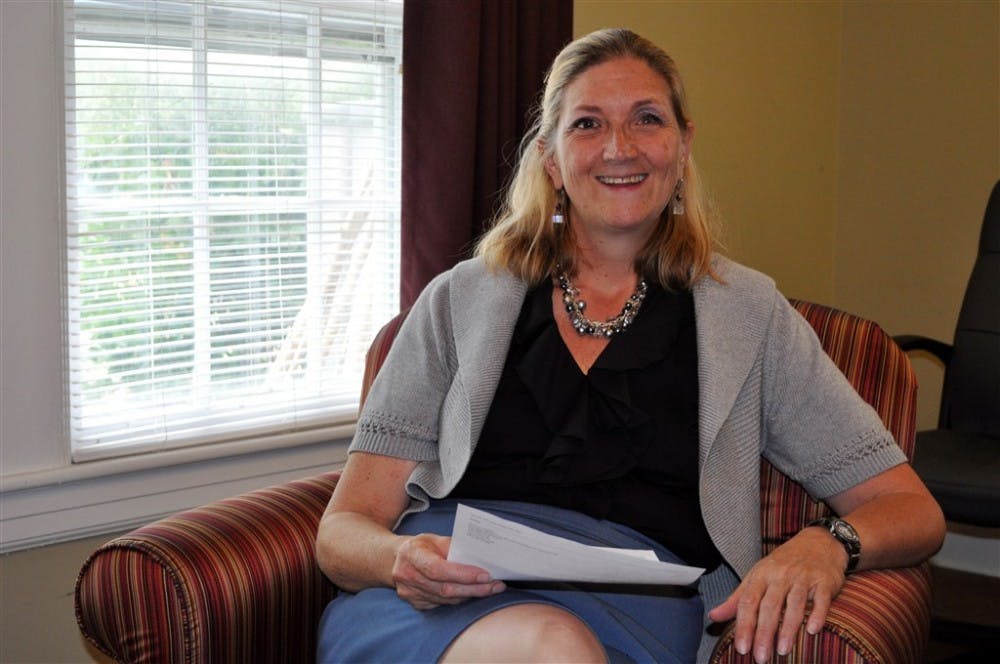It took several years before Janet Fuller would eat chicken or strawberries again.
"The bombers were coming over and overnight anti-aircraft guns were set up in the empty field across the street from our house," said Fuller, Elon University's new chaplain. "So we had the shrieking of bombers coming over us and the anti-aircraft shells would fall on our roof and roll into our yard."
Fuller's family knew war was coming and would be forced to stay inside their home. Knowing food would be scarce, her mother and father stocked up on frozen chicken and strawberries.
Before being pegged as the successor to Richard McBride, Elon's former chaplain who retired in 2009, and serving 24 years as the chaplain at Hollins University, Fuller lived through four wars in the Middle East as the daughter of Baptist missionaries. During the Six-Day War in 1967, Fuller was sleeping on a mattress in the hallway of her home with her family until they were evacuated to Iran by American forces.
"I was, for a long time, really traumatized about those experiences," she said. "Hiding in hallways, in shelters and basements. In high school, jumping under my chemistry lab desk when bombers flew over."
Fuller lived in various nations across the Middle East including Lebanon, Jordan and Iran as a blonde- haired, blue-eyed minority. Her parents chose to work in an Arab nation because of their appreciation for the culture, food and people.
"I have to say that my parents were a very respectful breed of missionaries and I really credit my upbringing for the passions that I come to Elon with," Fuller said. "I wasn't born or raised with the sense that I am right and you're wrong and I need to convince you to see things my way. I wasn't raised with that culturally or religiously."
Tragic events marred Fuller's childhood and made her question her religious background and ask difficult questions of her faith.
While visiting the church her father preached at on the Saturday before Easter, Fuller witnessed the destruction that would become commonplace. She was playing with her friend, Ibtisam, in an empty field when Ibtisam stepped on a landmine and was killed by the explosion. The blast knocked Fuller back and left her deaf for weeks.
"I remember being alone and then everyone came running," she said. "Everyone thought I was hurt because I was bloody. My parents arrived with the crowd and they didn't know what to do for me. They didn't know how to help me, they were clueless about war."
The family choose to ignore what happened and didn't speak of it, she said. As a result, Fuller became the one in her family who began to ask difficult questions and challenge the status quo.
Fuller left the Middle East to attend then-Hollins College as an undergraduate. After she graduated, she returned to Lebanon to teach and marry her childhood sweetheart, Saad Ziyadi. Ziyadi was studying to become a Greek Orthodox priest and was a member of a Christian militia.
"I was uncomfortable with him as an active participant in the military," she said. "And, of course, the civil war had its most terrible years in 1978 and 1979. So he made an agreement with his leader that he would not actively fight but would stand guard duty."
Less than six months after they were married, he left their home to guard the station when he was struck by a drive-by bombing.
"There was nothing left to identify him," she said. "I jumped into the car and found him. I was the first to arrive and then his colleagues arrived shortly after. It was the most painful moment of my life. It shattered everything I had planned."
It was that crystalizing moment that made her ask why the world was the way it was. It's a question many face, she said, and often leaves people wondering how there can be a caring deity in a world rife with suffering.
Fuller ended her contract as a teacher and went to seminary at Yale's Divinity School. After she graduated she served as the Baptist chaplain at Yale before becoming the full-time chaplain at Hollins.
The difficult moments in her past helped her relate to students who are struggling to find out who they are and how that shapes their religious and spiritual practices, she said.
"I've met some people who have never had any questions as to why they believe the things they believe," Fuller said. "But that seems strange to me when I meet it. But that is why I love students. They are inherently asking questions and making connections."
Fuller accepted the position as Elon University's chaplain this summer and officially began last week. She made the move, she said, because Elon was able to bridge aspects of her life that are normally left unconnected.
"One of the things that excites me about this work at Elon is that I do feel I get to draw on everything that I have ever done," she said. "It pulls together all of the things I have experienced and studied and cared about and wanted to do. It feels like it integrates parts of my life that are not normally integrated."


